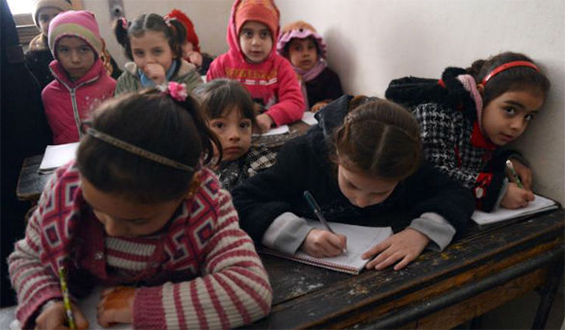
According to organizations that work with Syrian refugees, thousands of children seeking asylum in Britain are being refused access to schools in the country.
Several organizations have said that Syrian children who came to the United Kingdom either with their families or as unaccompanied minors have faced discrimination by local authorities and many have been forced to wait up to a year to be given a spot in a local school.
No single governing body provides access to education in the country, with it being left to local councils to find school placements for children.
Those who first arrive in the country with nowhere else to go live in Home Office initial accommodation. Children in this situation do not have the right to go to public schools, and the local councils do not believe it is up to them to find placements for them. In addition, these children are not placed on waiting lists for schools, while other children claiming asylum are able to do so. The Home Office will only say that they try to move the children from initial accommodation as quickly as they can.
Speaking to Diane Taylor for The Guardian, one father, whose asylum claim is still pending, said his daughter was denied access to a school when the family’s visa expired, forcing them to claim asylum. The family has spent the last five months living in Lynx House in Cardiff, which was recently at the center of an argument over forcing residents to wear wristbands in order to receive food.
“Our daughter had been in school before, but when we claimed asylum she was no longer allowed to go to school. She wants to continue with her GCSE courses, but has not been allowed to do so. Our daughter has become worried and disturbed because she is not allowed to go to school. Her dream is to become a doctor and education is a very important part of her life. The way we have been treated is playing with our emotions.”
The father continued to say that despite the fact that the family had been living in the country legally for several years, they were recently forced to claim asylum because it was too dangerous for them to return to their home country after he became politically active there.
Another mother said of her time at Lynx House that her children were given a few books to read while they were there, but that was it in the five months time they stayed there.
Meanwhile, the coordinator of the Croydon Refugee Day Centre, Peter Hall, said he takes care of as many as eight families at a time who are unable to access the education system for their children, with some remaining with him for months on end. He added that children who are denied an education in the country should be offered some form of home education system in the meantime.
Estimates from the United Nations suggest that six million children have been affected by the war, with around 3,000 coming to the UK every year as unaccompanied minors with conflicts in the Middle East causing that number to increase.




